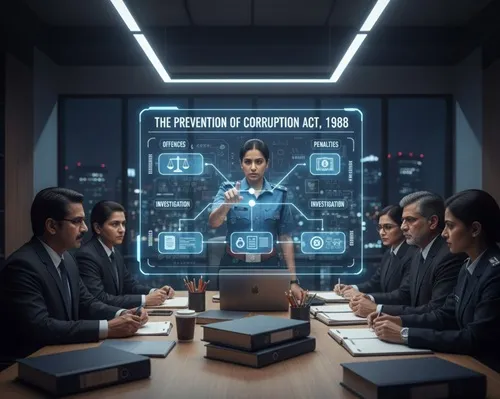
The Prevention of Corruption Act, 1988 is India's main law to punish corruption among public servants — such as government officers, politicians, judges, and employees of government bodies. It targets both the giver and taker of bribes, ensuring transparency and fairness in public administration.
Key Highlights
- Covers both sides: Taking or giving bribes is illegal.
- Who's a public servant: Government officers, ministers, judges, employees of government-owned companies, and anyone performing public duties.
- Bribes include: Money, gifts, services, employment, or any benefit to get or avoid official work.
2018 Amendment:
- The person offering the bribe can also be punished.
- "Facilitation" or "speed money" is also illegal.
- Prior approval from higher authority is needed before prosecuting senior officers.
Purpose of the Act
- To keep governance clean and accountable.
- To punish corrupt public servants and those who try to influence them.
- To build public trust by making government decisions transparent.
Where to Complain About Corruption
| Authority | Description | Website |
|---|---|---|
| Central Vigilance Commission (CVC) | Supervises all corruption cases involving central government employees | www.cvc.gov.in |
| Central Bureau of Investigation (CBI) – Anti-Corruption Wing | Handles serious corruption cases across India | cbi.gov.in |
| State Anti-Corruption Bureau (ACB) | Investigates state-level corruption complaints | Visit your state ACB site (e.g. acb.maharashtra.gov.in, acb.rajasthan.gov.in) |
| Lokpal / Lokayukta | Independent body to investigate public functionaries | lokpal.gov.in |
| Departmental Vigilance Officers | Accept complaints against specific government departments | Available on department websites (e.g., income tax, railways, etc.) |
Helpline Example:
CBI Anti-Corruption Helpline: 011-24362755
CVC Complaint Portal: https://portal.cvc.gov.in/
Punishments
| Offence | Punishment |
|---|---|
| Taking or demanding a bribe | 3 to 7 years (can extend up to 10 years) + fine |
| Giving a bribe | Up to 7 years + fine |
| Attempting to bribe | Punishable if intent is proven |
| Abetment or aiding in corruption | Same punishment as main offender |
State-wise Anti-Corruption Bureau (ACB) Websites
| State | ACB Website |
|---|---|
| Maharashtra | acb.maharashtra.gov.in |
| Rajasthan | acb.rajasthan.gov.in |
| Gujarat | acb.gujarat.gov.in |
| Karnataka | acb.karnataka.gov.in |
| Telangana | acb.telangana.gov.in |
| Andhra Pradesh | acb.ap.gov.in |
| Tamil Nadu | dgp.tn.gov.in |
| Kerala | vigilance.kerala.gov.in |
| Uttar Pradesh | upvigilance.gov.in |
FAQs – Prevention of Corruption Act, 1988
-
Q. What is corruption under this law?
-
A. Any act where a public servant takes or demands money, gifts, or favours for official work.
-
Q. Is giving a bribe also illegal?
-
A. Yes. Both giver and taker are punishable.
-
Q. What if I was forced to give a bribe?
-
A. You must report it within 7 days to the police, CVC, or ACB. You won't be punished if you report it.
-
Q. What if the officer only demands a bribe but doesn't take it?
-
A. Even the demand itself is a crime.
-
Q. Is "speed money" to get work done faster legal?
-
A. No. Even to speed up legitimate work, giving money is bribery.
-
Q. Can private people be punished under this law?
-
A. Yes. If they offer or help in giving a bribe to a public servant.
-
Q. Can senior officers be investigated freely?
-
A. No. Prior approval from higher authority is needed before prosecuting senior officials.
-
Q. Are politicians covered under this Act?
-
A. Yes. Ministers and elected representatives are also public servants.
-
Q. What if corruption happens in public sector banks or PSUs?
-
A. The same law applies — PSU employees are public servants.
-
Q. Can someone complain anonymously?
-
A. Yes, but giving detailed evidence and identity helps the investigation.
-
Q. Can digital or gift card bribes count?
-
A. Yes. Any form of benefit (cashless or otherwise) is covered.
-
Q. Is this Act only for big scams?
-
A. No. It applies even to small bribes, like ₹500 for document clearance.
-
Q. What if a complaint is false?
-
A. False complaints can lead to punishment under Section 248 of the Bharatiya Nyaya Sanhita.
Add new comment